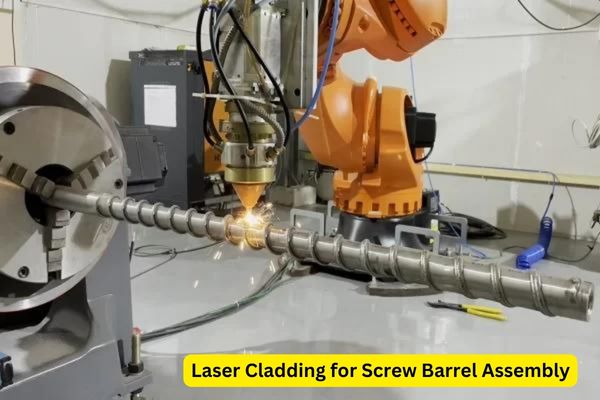Laser Cladding for Screw Barrel Assembly


Screw Barrel Assembly :
Screw Barrel Assembly is used for a variety of applications like plastic extrusion, injection molding, and similar manufacturing processes. In these processes, precision and consistency are very important. Screw barrel assembly is the driving force behind this process which is designed to transport, melt and shape molten raw materials according to requirement.
Mostly, the choice of raw materials for screw barrel assembly is EN41B, a chromium Molybdenum steel . It suits the application because it has high tensile strength, and can withstand intense mechanical stresses.
Other than EN41B, other materials like nitrided steel or bimetallic alloys are also used for screw barrel assemblies. Choice of material depends upon application specific requirements.
Working Environments, Challenges and solution:
Screw barrel assembly , along with intense mechanical stresses is also subject to constant friction, abrasion and corrosive environment during operation. Even though EN41B and similar materials with high tensile and mechanical strength can withstand mechanical stresses, over a period of time, they wear out.
Tungsten Carbide is a hard material, offers exceptional wear resistance and durability. It has high wear and abrasion resistance and also, high corrosion resistance. But, it is highly brittle and cannot withstand mechanical impacts.
So, to solve this problem, an advanced method, Laser Cladding is used to combine advantages of both the materials.
Laser Cladding
- Laser Cladding involves applying a layer of a different material onto the surface of base material to modify the surface properties of the base material.
- It is a precisely controlled process.
- By selectively cladding wear prone areas with Tungsten Carbide, manufacturers can achieve both mechanical strength of base material and wear and corrosion resistance of Tungsten Carbide.
- This optimizes the performance by combining strengths of both the materials, and also, enhancing life span of the assembly, eliminating the need for completely replacing the assembly, saving cost and downtime, thus enhancing productivity.
- Laser Cladding enables precise control over thickness of layer, so manufacturers can tailor the process to match specific stress points and wear patterns.
- Laser Cladding is a highly versatile process and can be adapted to different sizes, shapes and configurations of screw barrel assemblies, so a wide range of industries can benefit from its advantages.
Conclusion:
Union of base material with high tensile strength like EN41B, with Tungsten Carbide, a material suitable for coating due to its high abrasion and corrosion resistance has opened new possibilities for manufacturers to achieve greater production efficiency by enhancing durability of their equipment and reducing downtime.
We, at Laser Automation Private limited manufacture Special Purpose Laser Cladding Machines tailored to client’s requirements. Depending upon application, either robotic laser cladding machine or CNC based laser cladding machine can be used.
